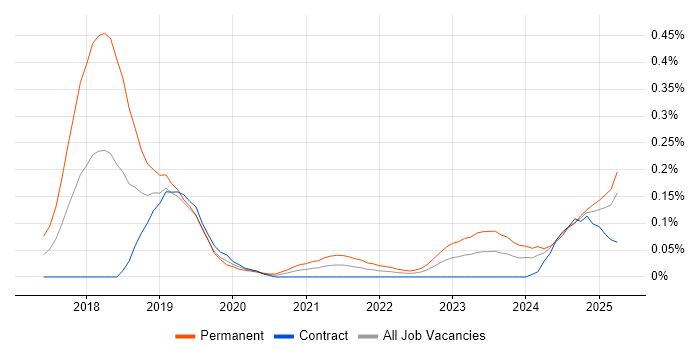scikit-learn
UK > Scotland
The table below provides summary statistics for permanent job vacancies advertised in Scotland requiring scikit-learn skills. It includes a benchmarking guide to the annual salaries offered in vacancies that cited scikit-learn over the 6 months leading up to 1 May 2025, comparing them to the same period in the previous two years.
| 6 months to 1 May 2025 |
Same period 2024 | Same period 2023 | |
|---|---|---|---|
| Rank | 141 | 273 | 219 |
| Rank change year-on-year | +132 | -54 | +26 |
| Permanent jobs citing scikit-learn | 4 | 4 | 3 |
| As % of all permanent jobs advertised in Scotland | 0.14% | 0.059% | 0.064% |
| As % of the Libraries, Frameworks & Software Standards category | 1.02% | 0.17% | 0.21% |
| Number of salaries quoted | 1 | 1 | 0 |
| Median annual salary (50th Percentile) | £70,000 | £60,000 | - |
| Median % change year-on-year | +16.67% | - | - |
| UK median annual salary | £85,253 | £65,000 | £75,000 |
| % change year-on-year | +31.16% | -13.33% | -6.25% |
All Software Libraries and Frameworks
Scotland
scikit-learn falls under the Software Libraries and Frameworks category. For comparison with the information above, the following table provides summary statistics for all permanent job vacancies requiring technical specification, industry standards, software libraries and framework skills in Scotland.
| Permanent vacancies with a requirement for technical specification, industry standards, software libraries and framework skills | 393 | 2,300 | 1,462 |
| As % of all permanent jobs advertised in Scotland | 13.95% | 34.14% | 30.95% |
| Number of salaries quoted | 293 | 646 | 771 |
| 10th Percentile | £31,250 | £38,750 | £40,000 |
| 25th Percentile | £45,000 | £45,313 | £46,250 |
| Median annual salary (50th Percentile) | £60,000 | £60,000 | £62,706 |
| Median % change year-on-year | - | -4.32% | +14.01% |
| 75th Percentile | £83,750 | £72,137 | £77,715 |
| 90th Percentile | £98,474 | £80,000 | £90,000 |
| UK median annual salary | £65,000 | £60,000 | £67,500 |
| % change year-on-year | +8.33% | -11.11% | +8.00% |
scikit-learn
Job Vacancy Trend in Scotland
Job postings citing scikit-learn as a proportion of all IT jobs advertised in Scotland.

scikit-learn
Salary Trend in Scotland
3-month moving average salary quoted in jobs citing scikit-learn in Scotland.
scikit-learn
Job Locations in Scotland
The table below looks at the demand and provides a guide to the median salaries quoted in IT jobs citing scikit-learn within the Scotland region over the 6 months to 1 May 2025. The 'Rank Change' column provides an indication of the change in demand within each location based on the same 6 month period last year.
| Location | Rank Change on Same Period Last Year |
Matching Permanent IT Job Ads |
Median Salary Past 6 Months |
Median Salary % Change on Same Period Last Year |
Live Jobs |
|---|---|---|---|---|---|
| Edinburgh | - | 3 | - | - | 8 |
| scikit-learn UK |
|||||
scikit-learn
Co-occurring Skills and Capabilities in Scotland by Category
The follow tables expand on the table above by listing co-occurrences grouped by category. The same employment type, locality and period is covered with up to 20 co-occurrences shown in each of the following categories:
